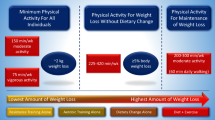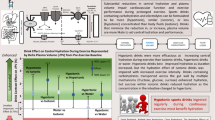Abstract
Purpose
Hypohydration has been suggested as a predisposing factor for several pathologies including cardiovascular diseases (CVD). While CVD are the leading cause of death worldwide, no study has investigated whether acute hypohydration affects endothelial function and cardiovascular function.
Methods
Ten young, healthy males participated in this crossover study (age: 24.3 ± 2.3 year; weight: 80.8 ± 5.3 kg; BMI: 24.3 ± 0.4 kg m−2). Each subject completed two measurements of endothelial function by flow-mediated dilation (FMD) in euhydrated and hypohydrated state separated by 24 h. Following baseline assessment of hydration status and FMD, the subjects completed 100 min of low-intensity intermittent walking exercise to achieve hypohydration of −2 % of individual body mass. For the rest of the day, a standardized, low water content diet was provided. The following morning, hydration markers and endothelial function were recorded.
Results
Hypohydration by −1.9 ± 0.1 % of body mass resulted in decreased plasma volume by −3.5 ± 1.8 % and increased plasma osmolality by 9 ± 2 mmol kg−1 (P < 0.001). FMD as a response to hypohydration decreased by −26.8 ± 3.9 % (P < 0.05).
Conclusion
The data suggested that a small degree of hypohydration induced by moderate exercise and fluid restriction significantly impaired endothelial function.

Similar content being viewed by others
References
Chan J, Knutsen SF, Blix GG, Lee JW, Fraser GE (2002) Water, other fluids, and fatal coronary heart disease: the adventist health study. Am J Epidemiol 155:827–833
Roussel R, Fezeu L, Bouby N, Balkau B, Lantieri O, Alhenc-Gelas F, Marre M, Bankir L, Group DESIRS (2011) Low water intake and risk for new-onset hyperglycemia. Diabetes Care 34:2551–2554
Thornton SN (2009) Angiotensin, the hypovolaemia hormone, aggravates hypertension, obesity, diabetes and cancer. J Intern Med 265:616–617
Lang F, Ritz E, Voelkl J, Alesutan I (2013) Vascular calcification-is aldosterone a culprit? Nephrol Dial Transplant 28:1080–1084
Dmitrieva NI, Burg MB (2015) Elevated sodium and dehydration stimulate inflammatory signaling in endothelial cells and promote atherosclerosis. PLoS ONE 10:e0128870
Strippoli GF, Craig JC, Rochtchina E, Flood VM, Wang JJ, Mitchell P (2011) Fluid and nutrient intake and risk of chronic kidney disease. Nephrology (Carlton) 16:326–334
Sarnak MJ, Levey AS, Schoolwerth AC, Coresh J, Culleton B, Hamm LL, McCullough PA, Kasiske BL, Kelepouris E, Klag MJ, Parfrey P, Pfeffer M, Raij L, Spinosa DJ, Wilson PW (2003) Kidney disease as a risk factor for development of cardiovascular disease: a statement from the American heart association councils on kidney in cardiovascular disease, high blood pressure research, clinical cardiology, and epidemiology and prevention. Circulation 108:2154–2169
Verma S, Anderson TJ (2002) Fundamentals of endothelial function for the clinical cardiologist. Circulation 105:546–549
Ross R (1999) Atherosclerosis is an inflammatory disease. Am Heart J 138:S419–S420
Yeboah J, Folsom AR, Burke GL, Johnson C, Polak JF, Post W, Lima JA, Crouse JR, Herrington DM (2009) Predictive value of brachial flow-mediated dilation for incident cardiovascular events in a population-based study: the multi-ethnic study of atherosclerosis. Circulation 120:502–509
Becker RC (1993) The role of blood viscosity in the development and progression of coronary artery disease. Cleve Clin J Med 60:353–358
Lee AJ, Mowbray PI, Lowe GD, Rumley A, Fowkes FG, Allan PL (1998) Blood viscosity and elevated carotid intima-media thickness in men and women: the Edinburgh artery study. Circulation 97:1467–1473
Tonstad S, Klemsdal TO, Landaas S, Hoieggen A (2006) No effect of increased water intake on blood viscosity and cardiovascular risk factors. Br J Nutr 96:993–996
Cohen RA (1995) The role of nitric oxide and other endothelium-derived vasoactive substances in vascular disease. Prog Cardiovasc Dis 38:105–128
Kavouras SA, Armstrong LE, Maresh CM, Casa DJ, Herrera-Soto JA, Scheett TP, Stoppani J, Mack GW, Kraemer WJ (2006) Rehydration with glycerol: endocrine, cardiovascular, and thermoregulatory responses during exercise in the heat. J Appl Physiol 100:442–450
Sawka MN, Burke LM, Eichner ER, Maughan RJ, Montain SJ, Stachenfeld NS (2007) American college of sports medicine position stand. Exercise and fluid replacement. Med Sci Sports Exerc 39:377–390
Castellani JW, Maresh CM, Armstrong LE, Kenefick RW, Riebe D, Echegaray M, Casa D, Castracane VD (1997) Intravenous vs. oral rehydration: effects on subsequent exercise-heat stress. J Appl Physiol 82:799–806
Kenefick RW, Maresh CM, Armstrong LE, Castellani JW, Riebe D, Echegaray ME, Kavorous SA (2000) Plasma vasopressin and aldosterone responses to oral and intravenous saline rehydration. J Appl Physiol 89:2117–2122
Kollias GE, Stamatelopoulos KS, Papaioannou TG, Zakopoulos NA, Alevizaki M, Alexopoulos GP, Kontoyannis DA, Karga H, Koroboki E, Lekakis JP, Papamichael CM (2009) Diurnal variation of endothelial function and arterial stiffness in hypertension. J Hum Hypertens 23:597–604
Mitchell GF, Parise H, Vita JA, Larson MG, Warner E, Keaney JF Jr, Keyes MJ, Levy D, Vasan RS, Benjamin EJ (2004) Local shear stress and brachial artery flow-mediated dilation: the Framingham Heart Study. Hypertension 44:134–139
Boon JC, Westbroek DL, Stelter WJ, Messmer K (1978) Sodium nitroprusside-induced hypotension in dogs. Drug sensitivity and resistance experimentally provoked by circulating blood volume alterations. Eur Surg Res 10:382–388
Dill DB, Costill DL (1974) Calculation of percentage changes in volumes of blood, plasma, and red cells in dehydration. J Appl Physiol 37:247–248
Green DJ, Maiorana A, O’Driscoll G, Taylor R (2004) Effect of exercise training on endothelium-derived nitric oxide function in humans. J Physiol 561:1–25
Greenleaf JE (1992) Problem: thirst, drinking behavior, and involuntary dehydration. Med Sci Sports Exerc 24:645–656
Robertson GL (1984) Abnormalities of thirst regulation. Kidney Int 25:460–469
Karatzi K, Papamichael C, Karatzis E, Papaioannou TG, Voidonikola PT, Lekakis J, Zampelas A (2007) Acute smoking induces endothelial dysfunction in healthy smokers. Is this reversible by red wine’s antioxidant constituents? J Am Coll Nutr 26:10–15
Fels J, Oberleithner H, Kusche-Vihrog K (2010) Ménage à trois: aldosterone, sodium and nitric oxide in vascular endothelium. Biochim Biophys Acta 1802:1193–1202
Thornton SN (2011) Angiotensin inhibition and longevity: a question of hydration. Pflugers Arch 461:317–324
Druppel V, Kusche-Vihrog K, Grossmann C, Gekle M, Kasprzak B, Brand E, Pavenstadt H, Oberleithner H, Kliche K (2013) Long-term application of the aldosterone antagonist spironolactone prevents stiff endothelial cell syndrome. FASEB J 27:3652–3659
Higashi Y, Noma K, Yoshizumi M, Kihara Y (2009) Endothelial function and oxidative stress in cardiovascular diseases. Circ J 73:411–418
King MA, Clanton TL, Laitano O (2016) Hyperthermia, dehydration, and osmotic stress: unconventional sources of exercise-induced reactive oxygen species. AJP 310:R105–R114
Boegehold MA, Drenjancevic I, Lombard JH (2015) Salt, angiotensin II, superoxide, and endothelial function. Compr Physiol 6:215–254
Gonzalez-Alonso J, Mora-Rodriguez R, Below PR, Coyle EF (1997) Dehydration markedly impairs cardiovascular function in hyperthermic endurance athletes during exercise. J Appl Physiol 82:1229–1236
Ma TK, Kam KK, Yan BP, Lam YY (2010) Renin-angiotensin-aldosterone system blockade for cardiovascular diseases: current status. Br J Pharmacol 160:1273–1292
Thornton SN, Hess K (2009) Exercise generates lactate and fluid intake: effects on mitochondrial function in heart and vascular smooth muscle. Hypertension 54:e14; author reply e15–e16
Koenig W, Sund M, Filipiak B, Doring A, Lowel H, Ernst E (1998) Plasma viscosity and the risk of coronary heart disease: results from the MONICA-Augsburg Cohort Study, 1984 to 1992. Arterioscler Thromb Vasc Biol 18:768–772
Lowe GD, Lee AJ, Rumley A, Price JF, Fowkes FG (1997) Blood viscosity and risk of cardiovascular events: the Edinburgh artery study. Br J Haematol 96:168–173
Ritz P, Berrut G (2005) The importance of good hydration for day-to-day health. Nutr Rev 63:S6–S13
Manz F, Wentz A (2005) The importance of good hydration for the prevention of chronic diseases. Nutr Rev 63:S2–S5
Haveman-Nies A, de Groot LC, Van Staveren WA (1997) Fluid intake of elderly Europeans. J Nutr Health Aging 1:151–155
Stachenfeld NS, DiPietro L, Nadel ER, Mack GW (1997) Mechanism of attenuated thirst in aging: role of central volume receptors. Am J Physiol 272:R148–R157
Stookey JD (2005) High prevalence of plasma hypertonicity among community-dwelling older adults: results from NHANES III. J Am Diet Assoc 105:1231–1239
Padilla J, Johnson BD, Newcomer SC, Wilhite DP, Mickleborough TD, Fly AD, Mather KJ, Wallace JP (2008) Normalization of flow-mediated dilation to shear stress area under the curve eliminates the impact of variable hyperemic stimulus. Cardiovasc Ultrasound 6:44
Brockow T, Conradi E, Ebenbichler G, Michalsen A, Resch KL (2011) The role of mild systemic heat and physical activity on endothelial function in patients with increased cardiovascular risk: results from a systematic review. Forschende Komplementarmedizin 18:24–30
Rognmo O, Bjornstad TH, Kahrs C, Tjonna AE, Bye A, Haram PM, Stolen T, Slordahl SA, Wisloff U (2008) Endothelial function in highly endurance-trained men: effects of acute exercise. J Strength Cond Res 22:535–542
Acknowledgments
The authors would like to thank the laboratory staff at Alexandra Hospital for their assistance. We gratefully also thank Dr. Evan C. Johnson & Lisa T. Jansen for their contribution to the manuscript.
Author information
Authors and Affiliations
Corresponding author
Ethics declarations
Conflict of interest
SAK has active grants with Danone Research.
Rights and permissions
About this article
Cite this article
Arnaoutis, G., Kavouras, S.A., Stratakis, N. et al. The effect of hypohydration on endothelial function in young healthy adults. Eur J Nutr 56, 1211–1217 (2017). https://doi.org/10.1007/s00394-016-1170-8
Received:
Accepted:
Published:
Issue Date:
DOI: https://doi.org/10.1007/s00394-016-1170-8




